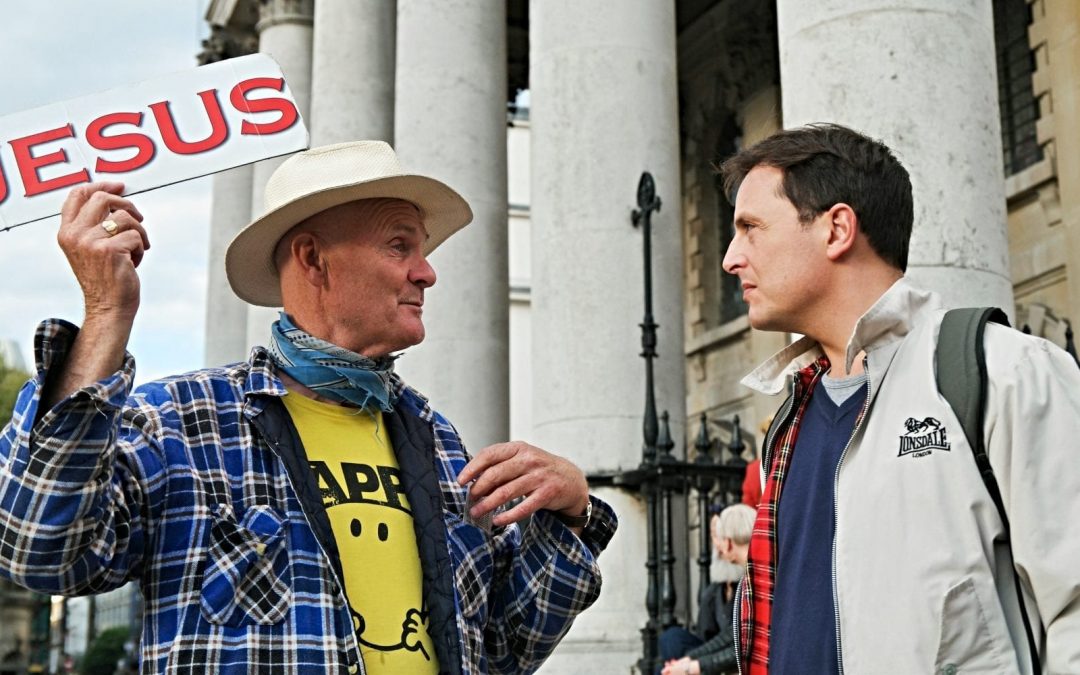Should street preachers be arrested?
That is the topic of a recent article by John Stackhouse, who serves as Samuel J. Mikolaski Professor of Religious Studies at Crandall University in Moncton, New Brunswick, Canada.
Stackhouse avoids rightly discussing the specific case of the arrest of a street preacher in Toronto for disturbing the peace; so do I.
In so far as the main thrust of Stackhouse’s post is that street preaching that alienates people is bad communication (“if one’s intention is actually to persuade, to successfully transfer an idea and enthusiasm to the other person rather than merely incite him or her to defensive rage, then one has to pick the message and the medium accordingly”), I agree.
In turn, I would argue that one of the features of the successful historical open-air preaching that Stackhouse mentions is that for various reasons the preachers came across as being on the side of, rather than against, the people they sought to reach.
Following on from the above, I am also not sure that Stackhouse is saying being a “pest” is a good enough reason for your freedom of speech and religion to be denied.
But for the record, I do not think being “provocative” or “annoying” or telling people they are sinners or being loud or “confrontational” or even verbally “haranguing” are necessarily in themselves sufficient reasons for a person to have their public freedom of speech denied.
If things such as freedom of speech are important, we certainly have to work at clarifying which speech we do not think comes under that category but in and of themselves I am not sure that verbally being a pest is sufficient.
It may not be neighborly, but I am not sure it is criminal.
Stackhouse mentions three considerations that we need to think about as we ponder the ethics of street preaching.
So, here are my ponderings about each, and I hope I represent the original claim fairly.
First, he writes, “In a society blessed with the printing press, television and the internet, it’s hard to make a case for public preaching on the ground that Canadians otherwise won’t hear the gospel. That case could be made at other places and times, but hardly so today.”
The physical public space is a place of constant ideological contest. I am not sure it should be abandoned.
It does not really make sense to me to argue that since communication takes place in some places and some ways (printing press, television and the internet), it should not take place in other places and in different ways.
Luke 14:23 has been a favorite verse of a variety of open-air preachers throughout history, and I think it still has some traction.
More than this, the practice of preaching in public space involves embodied presence in which a person shares space and time with other people.
I do not think that other stated forms of communication (printing press, television and the Internet) can claim the same incarnational validity.
The Word became flesh – not text or tweet or TV program. Yes, I am arguing a special theological case for public preaching as a practice in the ministry and mission of the church over and against other approaches. Call it foolish if you will (see 1 Corinthians 1:21).
Stackhouse, under his second heading, summarizes, “The point of preaching is to help. And if it manifestly isn’t helping, it’s manifestly wrong.”
I think that the point of preaching is to “teach” the church what it should be, “announce good news to the poor” and to “proclaim” release to oppressed and marginalized people groups (Luke 4:14-30).
If that is what is meant by “help,” fair enough, but as we know from that Scripture and the following narrative, such help is not always appreciated by those who have a vested interest in the status quo.
I also wonder what this means (“The point of preaching is to help. And if it manifestly isn’t helping, it’s manifestly wrong.”) if we apply this to in-church as well as to street preaching.
Unhelpful preaching is not simply found in the streets. Ironically, however, in the streets it can be easier to shout back or walk away than when constrained by convention, pew and stewards.
Back for a moment to freedom of religion and speech, I also wonder what this statement (“The point of preaching is to help. And if it manifestly isn’t helping, it’s manifestly wrong.”) means for preaching in services described as “public worship.”
Should they be silenced under laws that restrict freedom of speech just as though they were spoken in the street?
Stackhouse’s final consideration: “Third, we all need to play by the same rules. If we Christians would object (as I would) to a Muslim or Buddhist preacher standing on the sidewalk in front of a church on a Sunday morning to harangue everyone on his or her way in to worship, then why would we treat others the way we don’t want to be treated ourselves (Matthew 7:12)?”
In this context, I apply Matthew 7:12 (“So in everything, do to others what you would have them do to you, for this sums up the law and the prophets.”) quite differently from John.
For in the context described, I would defend the freedom of speech of the person on the street (regardless of their ideological position) precisely because I would want my own freedom of speech defended.
I may “object,” but I would not (and I am not sure if Stackhouse means this) seek their silencing through the use of law unless what was being said clearly exceeded the recognized limits of such speech.
This goes back again to the question of what we think the limits of such freedom are, not simply for us but others.
The above does not mean that I would want to harangue others nor that I think it a good thing (see my first paragraph).
I do, however, want to keep public places as places of public debate, discussion and “fierce conversation.”
Insofar as this is the case, I do not think that the answer to bad street preaching is no street preaching but thoughtful, embodied, counter performances of public preaching that stand in solidarity with the humanity among whom the preacher bears witness.
These are my ponderings on the ethics of street preaching.
Editor’s note: A version of this article first appeared on Blythe’s blog, Politurgy. It is used with permission.
Stuart Blythe is associate professor of the John Gladstone Chair in Preaching and Worship at Acadia Divinity College, Nova Scotia.


